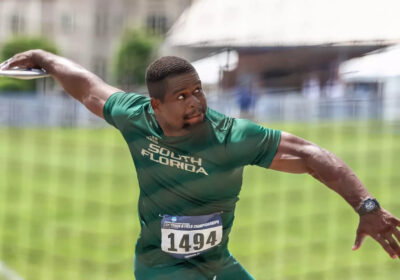The powerful women working alongside USF women’s soccer coach

One of USF women’s soccer coach Denise Schilte-Brown’s strongest qualities is her natural competitive nature, but what isn’t always shown is the powerful female athletic department that has helped her get to where she is now.
Schilte-Brown began her coaching career shortly after graduating from the University of Maryland where she played as a striker. Making history early on, she was the first woman to be inducted into the University of Maryland Baltimore County’s Athletic Hall of Fame.
In her sophomore year there, Schilte-Brown realized she could take her passion for soccer in a different direction — coaching.
After graduating in 1996, Schilte-Brown worked as an assistant coach at Eckerd College and then at the University of Tampa before returning to UMBC in 1999 as a head coach.
From 2000-2006, Schilte-Brown was the head coach at Virginia Commonwealth University where she was the only coach to lead the Rams to two NCAA tournaments. She left VCU with a 77-51-17 record.
Schilte-Brown has been coaching at South Florida since 2007, and is only the second coach in the program’s history. She has taken the Bulls to 13 conference tournaments out of her 15 seasons at USF, and has placed over 200 wins.
Her favorite part of the coaching position at USF is the bonds she’s built both with her team and faculty members, Schilte-Brown said. They all share the same mindset about shaping young student-athletes.
“When you first get into it as a young coach, you really think you’re just there to win soccer games,” Schilte-Brown said.
“But then you quickly come to grow and develop these relationships with young women and you realize ‘Wow, I could have such an impact in their lives that goes far beyond the soccer field and has far greater meaning in [both] my life and theirs.’”
During Schilte-Brown’s time at South Florida, the women in the USF Athletics Department have been a great asset to her success over the years.
Schilte-Brown said a motivating factor for the women working in USF Athletics is seeing them get an opportunity that other schools wouldn’t normally provide.
In the 2020-2021 academic year, only five out of 65 Division I athletic programs were led by women in the Power 5 conferences.
Luckily, at USF, Schilte-Brown said she has never felt any doubt in her leadership role as a woman.
“My life is really great here at USF. I have an administration that values me [and] cares about me a lot,” Schilte-Brown said.
“They care about female empowerment and are super intentional with the actions to raise money [and] raise leadership positions for women. Who I want to be as a coach is being amplified by the athletics department. It’s very hard to entice me away from [USF].”
Deputy athletics director, chief operating officer and senior women’s administrator Kris Pierce’s notable position requires her to oversee football, softball and the women’s lacrosse team with their sport administrators, while also having multiple people report to her as her SWA duties.
Choosing to come to South Florida was an easy decision for her to make after seeing how many women held superior roles at the university.
“It was the people and the opportunity that really brought me to USF in a very intriguing way,” Pierce said.
“[Working alongside these women] is something very motivating for me on a daily basis. [Seeing] our president being a woman is such a great opportunity for our female student-athletes and female staff to say ‘The highest position at this university is held by a woman, so there’s no reason you can’t do that as well’.”
Other faculty members have also put emphasis on how a good administrative staff can be beneficial for its players.
Assistant director of medicine and director of Olympic sports Michele Latimer started her career as a graduate assistant trainer under Schilte-Brown’s leadership.
Latimer said this inclusive environment is a testament to what USF has to offer and can be motivating for their female student-athletes to see in such a male-dominated industry.
“Having women in head coaching positions or administrative positions is awesome for our girls to interact with,” Latimer said. “I think it’s so crucial for our young women [to see people] who look like them in these powerful positions.”
“I think it’s [also] important for people to understand the increasing level of intensity of female sports over the past 20-30 years. Injuries are just as severe as you would see on the male side.”
In preparation for pre-season, Schilte-Brown has created a sister program between the freshmen and seniors on the team to guide each other as they get accustomed to college.
As for some of the training sessions, there are special days where players and faculty members get to know each other by playing a light-hearted game of soccer. Creating this bond between student-athletes and faculty members forms a feeling of unity between the groups, instead of one of imbalance.
Thanks to this supportive backbone, the Bulls have been able to go to ten NCAA tournaments and hold nine ACC Tournament appearances. Schilte-Brown holds a current record of 166-82-41 since her commencement at USF.
Although this progress is nice to see at a university level, Schilte-Brown says the fight for equality is far from over.
“The time to keep striving for more is now because women are hungry for that equality and we are fighting hard,” she said. “[We] are putting in the same amount of effort and passion as these young men.”







